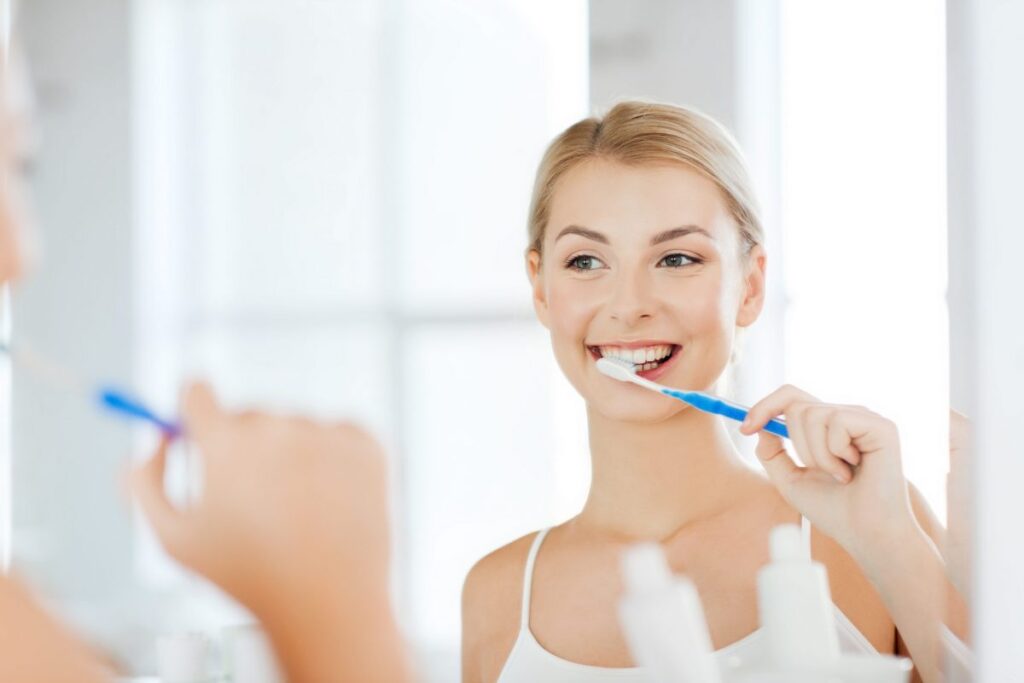Veneers are wafer-thin, custom-made shells that are cemented to the surfaces of your teeth. They offer a fast and long-lasting fix for teeth that are stained, chipped, misaligned, worn, or irregularly shaped. They’re a fantastic way to perfect your smile quickly, and with proper care, they’ll last for a decade or more.
There are two types of veneers: composite veneers (made of resin), and porcelain veneers (made of porcelain). You may end up with a less-natural looking smile if you opt for composite veneers as they are opaquer than the porcelain one’s veneers.
Porcelain is very similar to your tooth enamel; therefore, porcelain veneers tend to look just like teeth. Their shape, colour and size are fully customisable. This will enable your smile to look natural and beautiful.
A lot of individuals choose porcelain veneers because they can give an almost instantaneous boost to your smile.
Porcelain veneers are a good cosmetic dental solution for tooth and oral health problems including:
- Tooth enamel discoloration caused by things such as tooth decay, aging, illness, genetics, or use of medications
- Chips or fractures in the teeth
- Gaps between the teeth
- Uneven or worn-down teeth
- Crooked teeth
- Teeth that appear longer than they should
How to care for veneers
Table of Contents
Anyone who has ever worn traditional braces for any period knows that trying to care for a combination of teeth, gums, brackets, and wires can be a nightmare. Fortunately, learning how to care for veneers is the complete opposite. While it helps to be extra careful about certain things, no special care is required to keep your veneers looking amazing. In fact, caring for your veneers is as simple as following these six easy rules.
1. Practice good oral hygiene daily
If you already have a good dental hygiene routine, you probably won’t need to change it to care for your veneers. You just need to brush, flush, and rinse:
- Brush. Use either a manual or electric toothbrush to brush your teeth at least twice a day with a nonabrasive toothpaste; ideally, you should brush after every meal.
- Floss. Floss at least once a day to remove food particles caught between your teeth and to protect the health of your teeth, veneers, and gums. It’s ideal to floss after every meal.
- Rinse. Use mouthwash to rinse your mouth once or twice a day. Choose an alcohol-free mouthwash, because excessive exposure to alcohol can soften the bonding agent that holds the veneers to your teeth. While this softening wouldn’t cause the veneers to break off, it might make them more vulnerable to staining and deterioration.
2. Avoid the grind
Bruxism is the tendency to grind or clench your teeth while sleeping, and this means bad news for veneers because it puts a lot of stress on them. Truthfully speaking it’s also bad for your teeth and jaw joints, so if you suspect that you grind your teeth, speak with your dentist as soon as possible. Your dentist can fit you for a night-time bite guard, which is sometimes referred to as an occlusal guard. Wearing this guard while you sleep will protect both your new veneers and your natural teeth.
3. Chew wisely
Veneers are long-lasting, but they can chip and break. While normal foods shouldn’t cause a problem, it’s best to avoid chewing on excessively hard materials such as pens, nails, ice, and bones.
4. Protect your smile
Physical activity is an important part of a healthy lifestyle, but joining in basketball, football, wrestling, and other contact sports can endanger the health of your new smile. To protect your veneers and your natural teeth from possible trauma, invest in a mouth guard.
5. Beware of stains
Like your natural teeth, veneers can also be stained, so it would be a good idea to limit foods that are known to cause discoloration, like coffee, red wine, dark sodas, tea, soy sauce, and berries. Another source of stains is smoking, so if you smoke, you may want to consider quitting; not only will it improve your overall health, but it will also help keep your veneers white and bright.
6. Visit your dentist regularly
Routine dental check-ups are a must for people who want healthy teeth. Seeing your dentist roughly every six months will help to protect both your teeth and your veneers by ensuring that any potential problems are spotted rapidly and addressed before they become major issues. This is especially the case for the first month after getting veneers as the procedure can cause soreness to both your teeth and gums. That’s why it’s crucial to visit a dentist for dental and periodontal care in avon lake. Furthermore, your dentist or dental hygienist will use professional tools to polish your veneers and preserve their pearly-white gleam.
By concealing any imperfections, veneers let you quickly and effectively improve your smile. If you have more questions about how to care for veneers or want to further explore your cosmetic dentistry options, speak to your dentist now.

